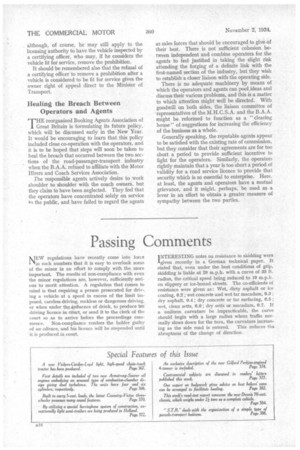Autocratic Methods in Vehicle Inspection
Page 35

Page 36

If you've noticed an error in this article please click here to report it so we can fix it.
COMPLAINTS are being received by us that k_..the inspection of goods vehicles in certain areas is becoming unduly severe. The industry was informed that, in the case of goods vehicles, greater latitude would be considered permissible than in connection with passenger vehicles, particularly at the beginning, because the insistence upon too high a standard would mean that large numbers of vehicles would have to be removed from service.
Some of the examiners appear also to have somewhat inflated ideas as to their importance and knowledge of their work. One man in a Northern Area recently stated that "no one could teach him anything about motor vehicles." We have been connected with the industry for a good many years ourselves, but we would hardly dare to make such a claim.
In the case of large fleets, the owners can obtain expert advice from outside and place this before the licensing authority where it is considered that injustice is being done, but the man in a small way of business has no redress of such a nature, although, of course, he may still apply to the licensing authority to have the vehicle inspected by a certifying officer, who may, if he considers the vehicle fit for service, remove the prohibition.
It should be remembered also that the refusal of a certifying officer to remove a prohibition after a vehicle is considered to be fit for service gives the owner right of appeal direct to the Minister of Transport.
Healing the Breach Between Operators and Agents
THE reorganized Booking Agents Association of Great Britain is formulating its future policy, which will be discussed early in the New Year. It would be encouraging to learn that this policy included close co-operation with the operators, and it is to be hoped that steps will soon be taken to heal the breach that occurred between the two sections of the road-passenger-transport. industry when the B.A.A. refused to affiliate with the Motor Hirers and Coach Services Association.
The responsible agents actively desire to work shoulder to shoulder with the coach owners, but they claim to have been neglected. They feel that the operators have concentrated solely on service to the public, and have failed to regard the agents as sales forces that should be encouraged to give of their best. There is not sufficient cohesion between independent and combine operators for the agents to feel justified in taking the slight risk attending the forging of a definite link with the first-named section of the industry, but they wish to establish a closer liaison with the operating side.
There is no adequate machinery by means of which the operators and agents can pool ideas and discuss their various problems, and this is a matter to which attention might well be directed. With goodwill on both sides, the liaison committee of representatives of the M.H.C.S.A. and the B.A.A. might be reformed to function as a "clearing house" of suggestions for increasing the efficiency of the business as a whole.
Generally speaking, the reputable agents appear to be satisfied with the existing rate of commission, but they consider that their agreements are for too short a period to provide sufficient incentive to fight for the operators. Similarly, the operators rightly maintain that a year is too short a period of validity for a road service licence to provide that security which is so essential to enterprise. Here, at least, the agents and operators have a mutual grievance, and it might, perhaps, be used as a lever in an effort to obtain a greater measure of sympathy between the two parties.




































































































